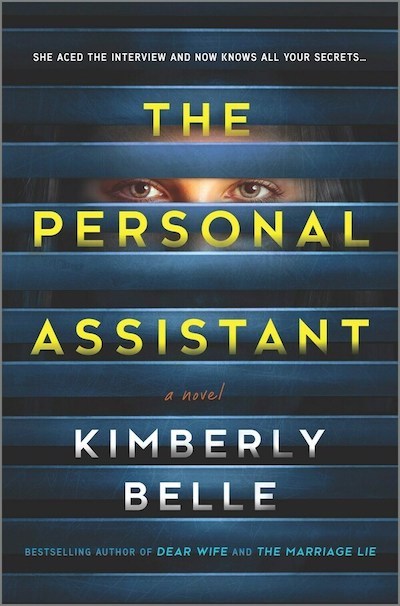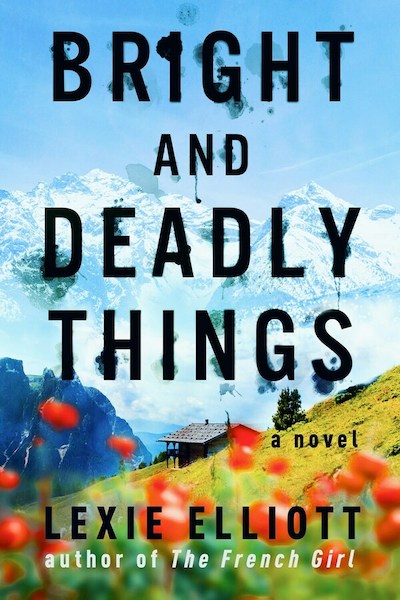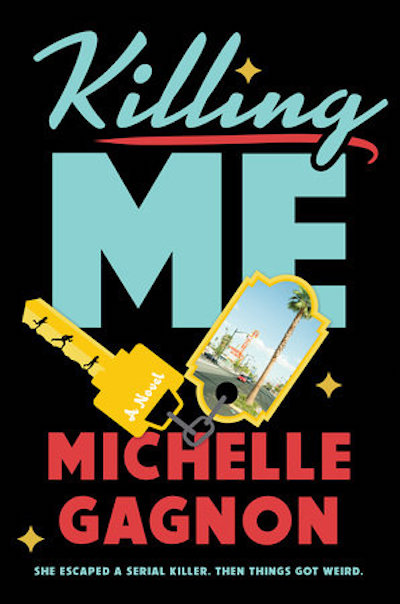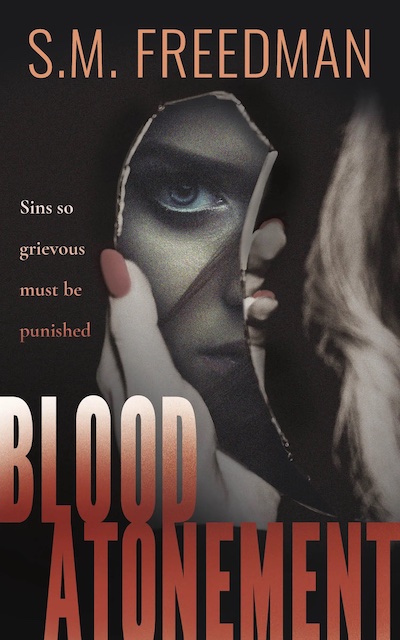@UnapologeticallyAlex is Alex Hutchinson’s wildly successful Instagram account, one that is moving toward a million followers until she and her personal assistant AC hit the booze and the next morning her following has turned rabid. Through her hangover haze, Alex sees that she has fifteen thousand notifications that give her in ALL ANGRY CAPS the information she dreads: last night, she trashed another online celebrity in a three-paragraph-long diatribe that might or might not have used the words “attention-seeking slut.” And that’s only the beginning. Alex and her handsome, financial-guru husband, Patrick, who has a successful TV show, along with their twin daughters, find themselves suddenly locked in a spiral of misfortune. Alex’s personal assistant—the one person who could fix this Insta nightmare—is missing. The police discover evidence of a crime in their carriage house. And the normally well-behaved twins are in trouble at school for drinking. Can it get worse? Oh yes, it can. Join Alex for this wild ride—you won’t be sorry!—and get ready for a look at the real world of online fame, which is made to seem both frighteningly exposing and frighteningly isolating by the masterful narrative and especially the inner dialogs of Alex, AC, and Patrick. While this is a thriller with tech as a catalyst, anyone who likes a great story will eat it up (the heaping spoonful of schadenfreude doesn’t hurt).
Suspense
Oxford don Emily is off to a retreat of sorts at Chalet des Anglais—a large estate in the French Alps, owned by several of the Oxford colleges. Emily is recently widowed, and this Alpine sojourn, including students and faculty—several of whom are her friends—seems to be exactly what the doctor ordered. But from the get-go, something isn’t right. Her house is burglarized as she is leaving for the airport. At the Chalet, someone rifles through her belongings and attempts to log into her laptop. Friends, too, are acting oddly, while an attractive undergrad is busy putting the moves on nearly everyone, including Emily. Not exactly a locked-room—let’s call it a locked chalet—the house is tremendously remote and, naturally, without any Internet access. Elliott slowly and skillfully builds the tension, carefully layering conversations, glances, overheard conversations, diary entries, and annual reports from the Chalet’s earlier years. When all hell finally breaks loose—and it certainly does, in multiple ways—Emily is left without anyone she can trust, forced to recreate her world
A little bit of a mystery, a whole lot of a thriller, and definitely a Savannah gothic, this novel is 100 percent guaranteed to creep you out. Holly and Dane are close as brother and sister, but when Dane starts having psychological problems in his final semester of college, Holly pulls back. After all, Dane now has Maura, his girlfriend who he has moved in with and who is taking care of him. But when Dane dies from suicide—he actually tried to disembowel himself—Holly spirals into a guilt-induced depression. “Get it out of me,” reads Dane’s last text to his sister. To understand what happened to Dane, Holly seeks out the mysterious and beautiful Maura, a florist obsessed with carnivorous plants and harnessing the power of botanicals. From stalking Maura to rooming with her to surrendering to her erotic powers, Holly realizes that if she doesn’t solve the mystery of what Maura did to Dane, then she will be forced to reenact it, with the same tragic results. A steamy f/f romance. Gothic vibes. A love story gone terribly wrong. Carnivorous roses. Get this title on Booktok!
I’ll admit it: it took me several tries to get past this novel’s disturbing opening scene, in which two women violently murder a man they just met and with whom they have zero connections. They stick him in the trunk of their car for a few hours, only to discover he’s not actually dead. Then they meticulously prep the body—who knew removing teeth to minimize identification was a thing?—and heave the now assuredly dead man over the side of a mountain. Turns out, this is just the latest murder of the serial killer sisters, identical 25-year-old triplets. Typically, their thing is to make men want them and fall in love with them. Then they kill them. It’s about a six-month process, and the first two sisters have racked up three murders each. But Sissy, our protagonist, has yet to make her first kill. She’s pulled her weight with her expertise in cleanup, removing any evidence that could connect the sisters to a murder site or a corpse. But she’s overdue in the murder department. The women have arrived in Arizona so that Sissy can focus on herself, and in no time she’s met the handsome, gentlemanly, church-going widower Edison. They quickly bond, and Sissy delights in her love affair with Edison as much as she enjoys imagining how she’ll kill him and where she’ll bury him. Until things change. Her desire to kill ebbs away, and her sisters grow increasingly anxious as they fear Sissy is pulling out of their agreement. A new, terrifying take on serial killers that will give fans the sleepless nights they crave.
Sophocles’ play Antigone, written in 441 BCE, is here pulled into modernity by Burt, a consultant for the United States Holocaust Memorial Museum. The ancient play sees brothers instigate a civil war, and one of their daughters, Antigone, defies her uncle and puts her brother first. So it is in The Dig, which opens amid a civil war, this time in 1993 Sarajevo, Bosnia. Andela, age three, and her brother Mujo, six, are found by American construction-worker brothers in the rubble of a destroyed building, their dead mother nearby. Their Antigone takes place in Thebes, Minnesota, where the children, now called Antonia and Paul, have a “typical American upbringing, blah, blah, no drama,” after being adopted by Eddie King, one of the brothers. Except it’s not really drama free. The blond and hearty residents of Thebes are not ready for the dark-haired, reticent Antonia and Paul, and Eddie dies of an overdose when he can’t handle the new responsibility. What the King family decides for the town is taken as local law, but Antonia defies her Uncle Christopher, graduating from law school and decidedly not working for her family. Paul rebels even more, protesting the Kings’ development of a new shopping area that displaces his Somali immigrant friends and then disappearing. Finding him and getting to the bottom of their pasts, both in Bosnia and more recently, will draw Antonia into a storm of lies and corruption and a fierce battle for control of her life. Feelings when ambition and family collide are no different today than in 411 BCE, and the resulting spectacle is no less captivating.
A double narrative, one in the present day, the other in 1974, both set in Villa Aestas on the outskirts of Orvieto, Italy. Emily, a 30-something writer of cozy mysteries, narrates the present. She’s going through a tough time: a messy divorce, writer’s block, and recovery from an awful, but undiagnosed, illness. So when Chess, her best friend since childhood, invites her to come along to the Italian villa she’s rented for six weeks, it’s a no brainer. Chess has become rich as a bestselling author of wellness/relationship books geared toward women and can easily afford an Italian villa fantasy. Villa Aestas is indeed charming, but it also has a dubious reputation, and Emily can’t help but investigate its past. It turns out that a famous rock star spent a summer there with several friends, a stay that ended in the murder of one of the men in the group. The two women in their midst fared far better; one went on to publish a horror novel that ended up a classic, while the other released a best selling album. Emily begins to recreate the narrative of that summer—through the novel, song lyrics, and documents she discovers in the villa—and becomes so obsessed that she begins a book about the summer of 1974. Chess meanwhile develops her own fascination with the murder, urging Emily to let her coauthor the book. As sinister details from the past emerge, equally disturbing revelations about the present come to light, and the two narratives begin to overlap. For fans of Lucy Foley.
Crimes and investigators that could not be more different collide in Donlea’s immersive thriller. The first crime is the obscure possible suicide, possible murder of a man who’s found hanging off his balcony in the Catskills area of upstate New York on July 15, 2001, and the other the murder of thousands in downtown New York City 27 days later. The investigators are Avery Mason, a glamorous, up-and-coming TV journalist and Walt Jenkins, a burned-out, former FBI agent who’s now living in Jamaica and steadily becoming an expert on rum. Fate brings the crimes and sleuths together when, twenty years later, a stunned medical examiner finds a match to a body part from the wreckage of the World Trade Center. It’s from a woman who was under investigation for the killing of the hanged man, and Walt, who investigated that hanging in 2001, and Avery, who’s breaking the story of the 9/11 victim and hoping to prove the woman’s innocence, are pushed together (not exactly against their will, it turns out) to get to the bottom of the decades-old case. There are many twists here, both in the backgrounds of the characters and in the secrets that are revealed. The tragedy of 9/11 is not taken lightly, rather it forms a fittingly sober backdrop to the torment faced by the characters in the past and today. For a readalike, try a series character who on the surface is nothing like Walt Jenkins, but who has the same kind of rock-steady kindness and intelligence: Kate Atkinson’s Jackson Brodie
Living a remote, punishing existence—he even asks to have the power to his cabin switched off in the Minnesota winter—former homicide detective Max Rupert has run away from his job more than retired from it. All readers know for most of the book is that he shoved a man through a hole in a frozen lake and is living with the aftermath of that choice. But why he did it, and whether he can allow himself to rejoin society, is a mystery. On a visit to town he runs into Lyle Voight, the former sheriff who’s been voted out of the job in favor of a corrupt newbie, and the man’s daughter, Sandy, and grandson, Pip. Seeing a family gives Max an unfamiliar and slightly disturbing feeling—happiness—and he’s helplessly drawn to jump in when, shortly after, Sandy and Pip vanish suddenly from their home. Puzzlingly, all signs point toward a planned absence. Next, we meet the sinister—and I mean sinister—duo behind the disappearance, and soon the chase is on, helped by Max’s former partner, Niki Vang. This thriller does a remarkable job of contrasting evil and love throughout, in the characters’ actions and dialog as well as in Max’s inner struggle between the positive force that keeps him going and the weight of self-loathing that holds him back. The three-dimensional portrayal of Niki, a wise-cracking and kind Vietnamese American detective and love interest, is a bonus. This is one to get lost in.
Ever feel like you’ve lost your reading mojo? Spending too much time consuming mediocre series on Netflix? Then this fun, female-driven narrative featuring a grifter/psych student, a terrifying serial killer, a cool and elegant femme fatale, and a handful of Las Vegas ladies is sure to get you back into the reading groove. A serial killer is stalking Amber’s college campus, and despite all her street smarts he manages to kidnap her, dragging her off to his lair. Just when things start to get serious, Amber is liberated by this cool and aloof woman who promptly disappears. But when the cops, and then the FBI, show up, Amber gets jittery—she and law enforcement don’t mix—so she heads out of town, randomly picking Vegas. It would be foolhardy to try to summarize this story; it’s got more twists and turns than the Tour de France. Let’s just say that Amber’s voice—witty with a side of snark—is just everything, the dialogue is pumping, and the characters are, strangely enough, completely credible. And how refreshing is it to read a thriller without any male leads? Turns out you don’t miss them at all. An absolute delight from beginning to end.
Locked-room mysteries and thrillers are booming, but this one has a twist. In the 1990s, young Grace DeRoche’s family lives in a Canadian branch of the FLDS, the Fundamentalist Church of Jesus Christ of Latter-Day Saints. Talk about a locked room. Children in the cult headed by Warren Jeffs, who in real life has only left the FBI’s Most-Wanted list because he’s serving a life sentence for child sexual assault, live with their fathers and the men’s multiple wives in Brigham, a secretive, abusive compound. They spend their days praying, in fear of outside-world apostates, are illiterate, and are subject to harsh “corrections.” Girls are married young to much older men. After the police come and “Brigham’s Ten”—Grace and nine other children—escape, the rest of the compound dies by mass suicide. In the years that follow, Grace remains in the locked room of her mind: she has dissociative identity disorder, with multiple personas taking over when she’s stressed. Stress comes in the deaths of members of the Ten, and Detective Beau Brunelli must protect Grace, a challenge when the woman doesn’t believe she needs protection and is too frightened and confused to accept help. Freedman could have made this sensationalist, but it’s a thought-provoking read, providing a look at life after a cult and portraying the survivors as real people, warts and all. The shocking ending here is a reward of its own, and getting there is a journey through incredible details of life inside Warren Jeffs’ world and inside the mind of a troubled woman. While you wait, try the Netflix documentary Keep Sweet: Pray and Obey, which covers the FLDS and is also absorbing.










